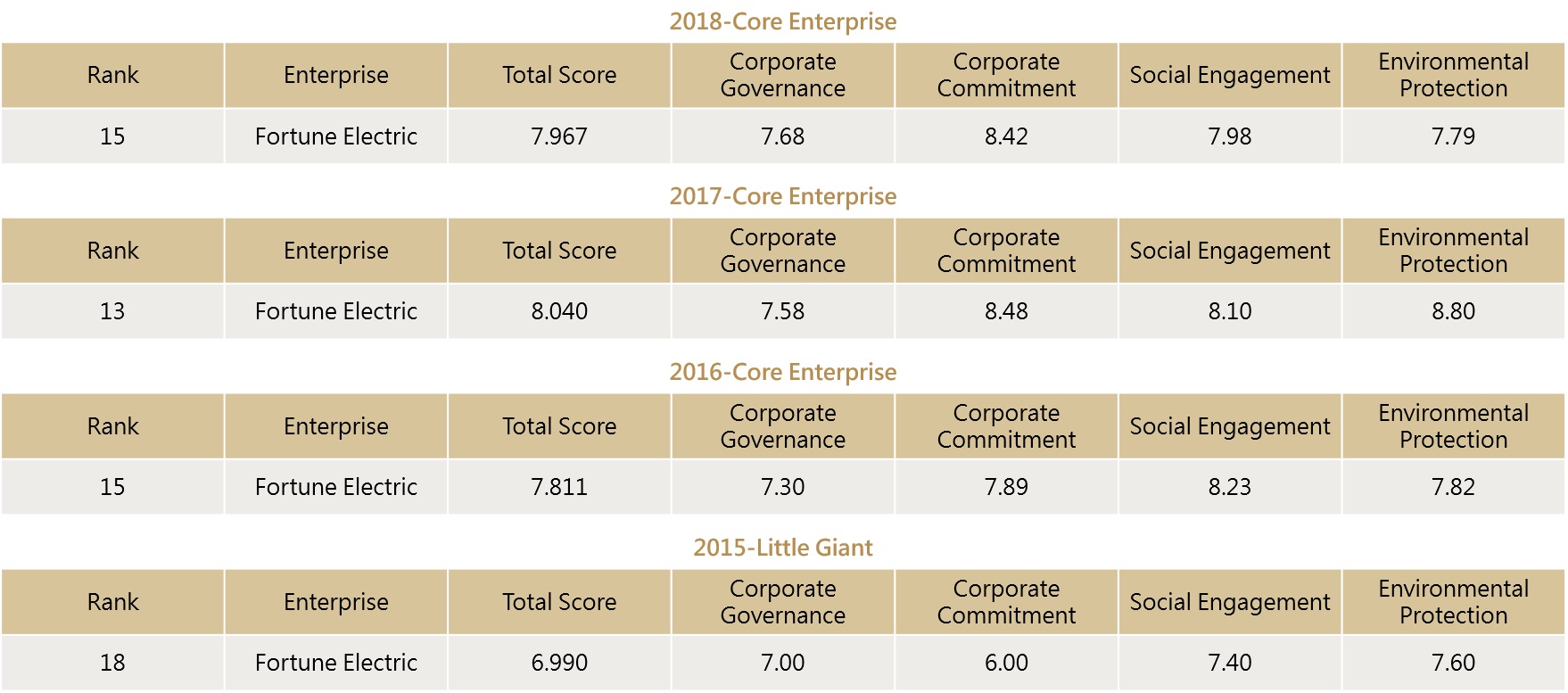執行單位及政策
已於111年3月通過董事會成立永續發展委員會,將協助董事會致力於持續推動永續發展和永續經營管理之落實,以強化公司治理體質、環境保護實際及善盡社會責任為目的(E.S.G)。
明訂志工委員會組織運作程序,並以「服務成就自己、熱忱美化鄉鎮、耐心服務人群、愛心健康社會」為宗旨,由董事會授權管理處責成「志工委員會組織」推動各項敦親睦鄰及公益慈善活動,定期召開委員會議,擬定年度計畫及追蹤管理實施成效並定期更新網站平台,並於公司各類刊物刊載。
詳情請參閱本公司網頁志工委員會專區。
供應商管理
採購作業標準中規定,華城之協力廠商需配合ISO及RoHS之相關規定,根據請購規範
中相同RoHS對六大危害物質之禁用/限用之管理,並確實執行。於1P2036承攬商安全衛生管理作業中規定,承攬廠商藉由工作證管理和安全衛生教育訓練及協議組織會議與安全巡視等良好的工作安全與衛生措施,達成本公司及承攬廠商意外事故的降低。減少意外事故發生,確保人員、設備與財產安全,於作業期間降低職安衛事故發生及減少對環境造成衝擊,藉由輔導制度,提升承攬廠商之共識及各項安全衛生知識,以維護本廠作業環境安全。
標準書1W1611簽認「環境及職安衛政策配合承諾書」,承諾環境方面減少並預防污染源排放、持續推行廢棄物減量及遵循環保法規等,職安方面訂定危害預防及自護人護政策,了解各項活動之潛在危害,採取降低風險之作業等,並配合本公司之ISO14001環境政策及ISO45001職安衛政策環境及職安衛政策、ISO50001能源政策等相關作業之要求,作為合格採用主要條件之一。
與協力廠商之訂定合約中已明訂需遵循相關法規、環境衛生及安全維護予以要求及規範,協力廠商應秉持企業對社會責任之精神,降低營運對生態效益、社區環境、人類社會產生影響,促進及宣導永續消費概念,並依下列原則從事研發、採購、生產、作業及服務等營運活動:
1. 減少產品與服務之資源及能源消耗。
2. 減少污染物、有毒物及廢棄物之排放,並應妥善處理廢棄物。
3. 增進原料或產品之可回收性與再利用。
4. 使可再生資源達到最大限度之永續使用。
5. 延長產品之耐久性。
6. 增加產品與服務之效能。
甲乙雙方須共同致力落實企業社會責任,若乙方涉及違反企業社會責任事項,且對供應來源社區之環境與社會造成顯著影響時,得隨時終止或解除契約之條款。
為強化供應商品質管理機能並落實施確保供應來源之環境與社會之影響於1W1611廠商開發評鑑明訂供應商及材料開發職責內容,及上述相關作業規定與其供應商合作,共同致力落實企業社會責任。
員工工作環境與人身安全的保護措施
本公司有計劃的實施環境測定及設備保養,並建制有EHS安全衛生資訊平台網站,以安全健康環境為目標推行ISO45001、ISO-14001及ISO-50001三套管理系統。
員工福利措施及退休制度
為保障員工職業安全衛生權益,特為每位員工投保「雇主補償契約責任保險暨團體傷害保險」、團體醫療保險,並設置職工福利委員會推動各項福利制度,使員工在經濟上、精神上均實質受惠。
本公司訂有完善退休制度,為保障選擇舊制退休金員工權利,除逐年提高提撥率外,並按月提撥員工退休準備金存入臺灣銀行運用生息,以因應、備足員工退休準備金。依法每月為新制退休員工提繳勞健保投保薪資百分之六退休金至員工個人退休金帳戶內及辦理員工自提退休金相關作業。
本公司設立員工持股信託計畫,旨在協助員工累積長期財富,提供穩定的財務規劃,保障員工退休或離職後的生活安定,並進一步強化員工福利機制,提升員工對公司長期發展的認同及歸屬感,符合公司永續經營的理念。
永續發展實務守則
華城電機股份有限公司(113年12月05日修訂,版次:2)
第一條 本公司為落實公司治理,履行企業社會責任,應考量國內外永續發展之發展趨勢,制定永續發展實務守則,以管理其對經濟、環境及社會風險與影響。
第二條 本守則以華城電機為適用對象,其範圍包括本公司及其集團企業組織整體營運活動。本公司在從事企業經營之同時,積極實踐永續發展,以符合國際展趨勢,並透過企業公民擔當,提升國家經濟貢獻,改善員工、社區、社會之生活品質,促進以永續發展為本之競爭優勢。
第三條 本公司推動永續發展,應注意利害關係人之權益,在追求永續經營與獲利同時,重視環境、社會與公司治理之因素,將其納入公司管理方針與營運活動,並依重大性原則,進行與公司營運相關之環境、社會及公司治理議題之風險評估,訂定相關風險管理政策或策略。
第四條 本公司對於永續發展之實踐,應依下列原則為之:
- 一、落實公司治理。
- 二、發展永續環境。
- 三、維護社會公益。
- 四、加強企業永續發展資訊揭露。
本公司永續發展承諾:本公司秉持華城「安員工」、「安顧客」、「安股東」、「安社會」的使命,致力於公司治理與誠信經營、拓展綠色能源事業、善盡企業社會責任及環境永續共存。
第五條 本公司應參考國內、外永續議題之發展趨勢與企業核心業務之關聯性、公司本身及其集團企業組織整體營運活動對利害關係人之影響等,訂定永續發展政策、制度或相關管理方針及具體推動計畫,得經董事會通過後,並提股東會報告。
股東提出涉及永續發展之相關議案時,公司董事會宜審酌列為股東會議案。
第六條 本公司應遵循公司治理實務守則、公司誠信經營守則及員工品德考核遵循要點,建置有效之治理架構,以健全公司治理。
第七條 本公司之董事應盡善良管理人之注意義務,督促企業實踐永續發展,並隨時檢討其實施成效及持續改進,以確保永續發展政策之落實。 本公司之董事會於公司推動永續發展目標時,宜充分考量利害關係人之利益並包括下列事項:
一、 提出永續發展使命或願景,制定永續發展政策、制度或相關管理方針。
二、 將永續發展納入公司之營運活動與發展方向,並核定永續發展之具體推動計畫。
三、 確保永續發展相關資訊揭露之即時性與正確性。
本公司針對營運活動所產生之經濟、環境及社會議題,得由董事會授權高階管理階層處理,並向董事會報告處理情形,其作業處理流程及各相關負責之人員應具體明確。
第八條 本公司應定期舉辦履行永續發展之教育訓練,包括宣導前條第二項等事項。
本公司全體員工及及其集團企業組織應依「職場四大考驗」,落實「真實、公平、信譽友誼、彼此利益」企業文化,以落實公司治理及履行企業社會責任。
第九條 本公司為健全永續發展之管理,連結本公司創辦人「台北市許憲樑社會福利基金會」,設置「華城電機志工委員會」,負責永續發展政策、制度或相關管理方針及具體推動計畫之提出及執行。
本公司應訂定合理之薪資報酬政策,以確保薪酬規劃能符合組織策略目標及利害關係人利益。
員工績效考核制度應與永續發展政策結合,並設立明確有效之獎勵及懲戒制度。
第十條 本公司應本於尊重利害關係人權益,辨識公司之利害關係人,並於公司網站:透過適當溝通方式,瞭解利害關係人之合理期望及需求,並妥適回應其所關切之重要永續發展議題。
第十一條 本公司應遵循環境相關法規及相關之國際準則,適切地保護自然環境,且於執行營運活動及內部管理時,應致力於達成環境永續之目標。
第十二條 本公司應致力於提升各項資源之利用效率,並使用對環境負荷衝擊低之再生物料及可自然分解之物料,使地球資源能永續利用。
第十三條 本公司應依其產業特性建立合適之環境管理制度,該制度應包括下列項目:
一、 收集與評估營運活動對自然環境所造成影響之充分且及時之資訊。
二、 建立可衡量之環境永續目標,並定期檢討其發展之持續性及相關性。
三、 訂定具體計畫或行動方案等執行措施,定期檢討其運行之成效。
第十四條 本公司設立環境管理專責單位「安全衛生部」及人員,與各單位共同推動各項環境相關政策,擬訂、推動及維護相關環境管理制度及具體行動方案,並定期舉辦對管理階層及員工進行環境教育課程。
第十五條 本公司應考量營運對生態效益之影響,促進及宣導永續消費之概念,並依下列原則從事研發、採購、生產、作業及服務等營運活動,以降低公司營運對自然環境及人類之衝擊:
一、 減少產品與服務之資源及能源消耗。
二、 減少污染物、有毒物及廢棄物之排放,並應妥善處理廢棄物。
三、 增進原料或產品之可回收性與再利用。
四、 使可再生資源達到最大限度之永續使用。
五、 延長產品之耐久性。
六、 增加產品與服務之效能。
第十六條 為提升水資源之使用效率,本公司應妥善與永續利用水資源,並訂定相關管理措施。
本公司應興建與強化相關環境保護處理設施,以避免污染水、空氣與土地;並盡最大努力減少對人類健康與環境之不利影響,採行最佳可行的污染防治和控制技術之措施。
第十七條 本公司宜評估氣候變遷對公司現在及未來的潛在風險與機會,採取氣候相關議題之因應措施,並採用國內、外通用之標準或指引,執行企業溫室氣體盤查並予以揭露,其範疇包括:
一、 直接溫室氣體排放:溫室氣體排放源為公司所擁有或控制。
二、 間接溫室氣體排放:外購電力、熱或蒸汽等能源利用所產生者。
本公司宜統計溫室氣體排放量、用水量及廢棄物總重量,並制定公司節能減碳、溫室氣體減量、減少用水或其他廢棄物管理之政策,及將碳權之取得納入本公司減碳策略規劃中,且據以推動,以降低公司營運活動對氣候變遷之衝擊。
第十八條 本公司應遵守相關法規,及遵循國際人權公約,如性別平等、工作權及禁止歧視等權利。本公司為履行其保障人權之責任,應制定相關之管理政策與程序,其包括:
一、 提出企業之人權政策或聲明。
二、 評估公司營運活動及內部管理對人權之影響,並訂定相應之處理程序。
三、 定期檢討企業人權政策或聲明之實效。
四、 涉及人權侵害時,應揭露對所涉利害關係人之處理程序。 本公司應遵循國際公認之勞動人權,如結社自由、集體協商權、關懷弱勢族群、 禁用童工、消除各種形式之強迫勞動、消除僱傭與就業歧視等,並確認其人力資 源運用政策無性別、種族、社經階級、年齡、婚姻與家庭狀況等差別待遇,以落 實就業、雇用條件、薪酬、福利、訓練、考評與升遷機會之平等及公允。
對於危害勞工權益之情事,本公司應提供有效及適當之申訴機制,確保申訴過程之平等、透明。申訴管道應簡明、便捷與暢通,且對員工之申訴應予以妥適之回應。
第十九條 本公司應提供員工資訊,使其了解依營運所在地國家之勞動法律及其所享有之權利。
第二十條 本公司應提供員工安全與健康之工作環境,包括提供必要之健康與急救設施,並致力於降低對員工安全與健康之危害因子,以預防職業上災害。
本公司應對員工定期實施安全與健康教育訓練。
第二十一條 本公司應為員工之職涯發展創造良好環境,並建立有效之職涯能力發 展培訓計畫,訂定及實施合理員工福利措施(包括薪酬、休假及其他福利等),並 將經營績效或成果適當反映於員工薪酬,以確保人力資源之招募、留任和鼓勵, 達成永續經營之目標。
第二十二條 本公司應建立員工定期溝通對話之管道,讓員工對於公司之經營管理 活動和決策,有獲得資訊及表達意見之權利。
本公司應尊重員工代表針對工作條件行使協商之權力,提供員工必要之資訊與硬 體設施,以促進雇主與員工及員工代表之協商與合作。
本公司應以合理方式通知對員工可能造成重大影響之營運變動。
第二十二條之一 本公司對其產品或服務所面對之顧客或消費者,應以公平合理之 方式對待,其方式包括訂約公平誠信、注意與忠實義務、廣告招攬真實、商品或 服務適合度、告知與揭露、酬金與業績衡平、申訴保障、業務人員專業性等原則, 並訂定相關執行策略及具體措施。
第二十三條 本公司應對產品與服務負責並重視行銷倫理。其研發、採購、生產、 作業及服務流程,應確保產品及服務資訊之透明性及安全性,制定且公開其消費 者權益政策,並落實於營運活動,以防止產品或服務損害消費者權益、健康與安 全。
第二十四條 本公司應依政府法規與產業之相關規範,確保產品與服務品質。
本公司對產品與服務之顧客健康與安全、客戶隱私、行銷及標示,應遵循相關法 規與國際準則,不得有欺騙、誤導、詐欺或任何其他破壞消費者信任、損害消費 者權益之行為。
第二十五條 本公司應評估並管理可能造成營運中斷之各種風險,降低其對於顧客 與社會造成之衝擊。
本公司應對其產品與服務提供透明且有效之顧客申訴程序,公平且即時處理顧客 之申訴,並應遵守個人資料保護法等相關法規。
第二十六條 本公司應評估採購行為對供應來源社區之環境與社會之影響,並與其 供應商合作,共同致力落實企業社會責任。
本公司宜訂定供應商管理政策,要求供應商在環保、職業安全衛生或勞動人權等 議題遵循相關規範,於商業往來之前,應評估其供應商是否有影響環境與社會之 紀錄,避免與企業之社會責任政策牴觸者進行交易。
本公司與其主要供應商簽訂契約時,其內容應包含遵守雙方之企業社會責任政 策,及供應商如涉及違反政策,且對供應來源社區之環境與社會造成顯著影響時, 得隨時終止或解除契約之條款。
第二十七條 本公司應評估公司經營對社區之影響,並適當聘用公司營運所在地之 人力,以增進社區認同。
本公司應經由商業活動、實物捐贈、企業志工服務或其他公益專業服務,將資源 投入透過商業模式解決社會或環境問題之組織或參與社區發展及社區教育之公民 組織、慈善公益團體及地方政府機構之相關活動,以促進社區發展。
第二十七條之一 本公司宜經由捐贈、贊助、投資、採購、策略合作、企業志願技術服務或其他支持模式,持續將資源挹注文化藝術活動或文化創意產業,以促進文化發展。
第二十八條 本公司應依相關法規及公司治理實務守則辦理資訊公開,並應充分揭露具攸關性及可靠性之永續發展相關資訊,以提升資訊透明度。本公司揭露永續發展之相關資訊如下:
一、經董事會決議通過之永續發展之政策、制度或相關管理方針及具體推動計畫。
二、落實公司治理、發展永續環境及維護社會公益等因素對公司營運與財務狀況所產生之風險與影響。
三、公司為永續發展所擬定之履行目標、措施及實施績效。
四、主要利害關係人及其關注之議題。
五、主要供應商對環境與社會重大議題之管理與績效資訊之揭露。
六、其他永續發展相關資訊。
第二十九條 本公司編製永續報告書採用國際上廣泛認可之準則或指引,以揭露推動永續發展情形,並取得第三方確信或保證,以提高資訊可靠性,其執行內容包括:
一、 實施永續發展政策、制度或相關管理方針及具體推動計畫。
二、 主要利害關係人及其關注之議題。
三、 公司於落實公司治理、發展永續環境、維護社會公益及促進經濟發展之執行績效與檢討。
四、 未來之改進方向與目標。
第三十條 本公司應隨時注意國內外永續發展相關準則之發展及企業環境之變遷,據以檢討並改進公司所建置之永續發展制度,以提升履行永續發展成效。
天下雜誌-CSR歷屆排名

資料來源:天下CSR網頁